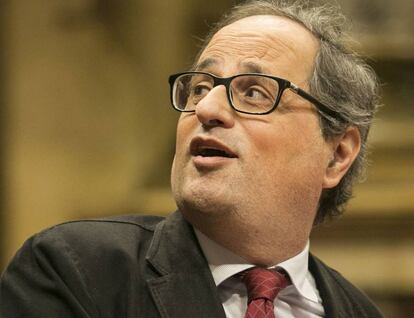Investiture vote called for hard-line Catalan separatist Quim Torra
Catalonia may see a new premier voted in by Monday, albeit a controversial one, more than 100 days after the snap election results plunged the region into more political chaos


Catalan house speaker Roger Torrent on Friday called an investiture ceremony for Saturday at noon to potentially swear in Joaquim Torra i Pla as Catalan premier. The announcement comes after ousted regional leader Carles Puigdemont named Quim Torra, as he is commonly known, as his replacement candidate, a move that could an end a months-long deadlock.
Unlike previous candidates, Torra is not facing charges for his involvement in the independence declaration or in self-imposed exile
For Torra to be sworn in at this first vote he would need an absolute majority of votes (68 of a total of 135). That would mean the support of Together for Catalonia, the Catalan Republican Left (ERC) and the far-left anti-capitalist CUP party, who hold 70 seats in the parliament after December’s regional elections. If Torra fails to secure an absolute majority on Saturday, as is likely, a second session will be called on Monday where he could be voted in with a simple majority – the 66 votes of ERC and Together for Catalonia against the 65 votes of Ciudadanos, the Popular Party (PP), the Spanish Socialists (PSOE) and Podemos. The region will face fresh elections if a new leader is not found by May 22.
Puigdemont named Torra as his successor after his party, Junts per Catalunya (Together for Catalonia), saw a legislative reform that would have allowed Puigdemont to be remotely sworn in as premier suspended by the Constitutional Court. This was the third attempt to get Puidgemont elected. The ousted leader is currently in Germany awaiting a ruling on an extradition request from Spain and is unable to physically appear at the investiture ceremony, a legal requisite for the appointment to be legitimate.
In a video address, Puigdemont stressed that Torra would be sworn in as an interim measure. “This is about a provisional period, marked by the conditions of the state: the political prisoners, the exile and the permanent threat of the application of Article 155 of the Constitution,” said Puigdemont in the video, making reference to the constitutional provision that allowed Madrid to temporarily suspend Catalonia’s regional powers. Indeed, sources from Together for Catalonia say Puigdemont does not want Torra to use his former office.
The nomination of Torra comes after three failed nominations, the last of which lacked support from Catalonia’s third separatist group, the far-left anti-capitalist CUP party. But unlike previous candidates – Puigdemont, Jordi Sànchez from the separatist Catalan Republican Left (ERC) and grassroots independence activist Jordi Turull – Torra is not facing charges for his involvement in the unilateral declaration of independence or in self-imposed exile.
Who is Joaquim Torra i Pla?
Torra is described as a hard-line separatist and a staunch opponent of the Spanish government. “They want to mute us, to silence us, they want as to be frightened and afraid. They even want us in prison and in exile,” he recently said in Parliament. “I have always been an emotional separatist,” Torra says of himself.
Trained as a lawyer, Torra has been in politics for only 10 years. He is the author seven books, many about Catalan journalists and intellectuals in the 20s and 30s, and was an editor for the Catalan publishing house A Contra Vent.
His activism work led him to a spot on the advisory council of the Catalan National Assembly in 2011 and he quickly rose through the ranks, landing appointments as the head of Barcelona Born Cultural Center and the president of Òmnium Cultural, the Catalan independence association behind the controversial “Help Catalonia. Save Europe” propaganda video.
Controversial tweets
On Twitter, Torra is equally vehement, writing polemical messages such as: “Evidently we have been living under Spanish occupation since 1714;” “Spaniards only know how to plunder;” and: “Shame is a word the Spaniards long ago deleted from their vocabulary.” Many of his messages were recently deleted but screenshots remain of their contents.
Other controversial tweets include: “It was a joke. Gentlemen, if we continue here for more years we run the risk of going crazy like the Spanish,” “The Spanish in Catalonia are like energy: they don’t disappear, they transform;” “Above all, what is surprising is the tone, poor education, Spanish snobbery, sense of filth. Horrible.”
The main opposition Spanish Socialist Party (PSOE) said that they “regretted that the separatist bloc had chosen one of their most sectarian profiles” to run as premier.
English version by Melissa Kitson.
Tu suscripción se está usando en otro dispositivo
¿Quieres añadir otro usuario a tu suscripción?
Si continúas leyendo en este dispositivo, no se podrá leer en el otro.
FlechaTu suscripción se está usando en otro dispositivo y solo puedes acceder a EL PAÍS desde un dispositivo a la vez.
Si quieres compartir tu cuenta, cambia tu suscripción a la modalidad Premium, así podrás añadir otro usuario. Cada uno accederá con su propia cuenta de email, lo que os permitirá personalizar vuestra experiencia en EL PAÍS.
¿Tienes una suscripción de empresa? Accede aquí para contratar más cuentas.
En el caso de no saber quién está usando tu cuenta, te recomendamos cambiar tu contraseña aquí.
Si decides continuar compartiendo tu cuenta, este mensaje se mostrará en tu dispositivo y en el de la otra persona que está usando tu cuenta de forma indefinida, afectando a tu experiencia de lectura. Puedes consultar aquí los términos y condiciones de la suscripción digital.








































